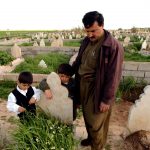In the wake of the Saddam Hussein’s brutal Anfal campaign in the late 1980s, in which tens of thousands of Kurds disappeared, PHR investigators travelled to Iraqi Kurdistan to help exhume, identify, and determine the probable cause of death of victims found buried in single and mass graves. The team, together with researchers from Human Rights Watch, alleged that the massacre of Iraqi Kurds and destruction of their villages amounted to genocide. PHR scientists’ survey of refugees who fled to southeastern Türkiye to assess the use of chemical weapons against Iraq’s Kurdish population during reported poison gas attacks in 1988 determined that mustard gas and an unknown lethal nerve agent had been dropped on Kurdish villages by the forces of Iraqi dictator Saddam Hussein. Later, scientists were able to collect solid samples and other evidence from the pertinent villages inside Iraq, which confirmed the deployment of the banned nerve agent sarin.
In December 1991, Middle East Watch and Physicians for Human Rights sent a delegation to northern Iraq to observe and assist in the exhumation, identification, and determination of probable cause and manner of death of individuals interred in mass and single, unmarked graves. We took testimony from grave diggers who, years earlier, had been ordered by Iraqi officers to secretly bury the bodies of executed political prisoners. We also interviewed a 15-year-old boy whose testimony may hold the key to one of the greatest mysteries in Iraqi Kurdistan: what happened to at least 100,000 men, women, and children who the Kurds say have disappeared without trace. Read more in our 1992 report “Unquiet Graves:The Search for the Disappeared in Iraqi Kurdistan“.
PHR’s current work in Iraq is focused on training and preparing medical and non-medical professionals to investigate and prosecute international crimes and acts of sexual violence. Through trainings, PHR and local partners are helping to ensure that survivors of torture and sexual violence gain access to high-quality medical-legal evaluations, without risk of re-traumatization, from clinicians trained in human rights principles and forensic methods.
PHR continues to support the documentation of crimes against the Yazidi people, who suffered brutal attacks by ISIS in 2014 during which thousands of men, women, boys, and girls were killed, forced into flight, or abducted, raped, and enslaved. Dr. Nagham Nawzat Hasan was honored for her work with Yazidi survivors at PHR’s 2018 gala.

